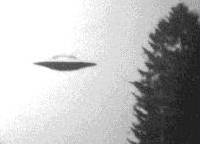Article/Document:
UFOs in 15th century paintings
Richard Owen, news.com.au (Australia), December 04, 2002 (The Times / The Australian)
original source | fair use notice
Summary: ITALY'S Old Masters were recording flying saucers and UFOs in their paintings as far back as the 15th century, according to a scientist in Rome. Roberto Volterri argues that artists dating back to 1406 included evidence of "strange objects in the sky" for later generations to see.
ITALY'S Old Masters were recording flying saucers and UFOs in their paintings as far back as the 15th century, according to a scientist in Rome.
Roberto Volterri argues that artists dating back to 1406 included evidence of "strange objects in the sky" for later generations to see. He says that far from being the product of the paranoid Cold War years, UFOs were documented but overlooked because they were often extraneous to the subject of the painting and could only be explained as "testimonials of something seen or heard about".
Volterri, 56, an archaeologist by training, specialises in the measurement and analysis of metallic objects. He said he had spent his working life in a thoroughly down-to-earth environment of cold and rational calculation and sophisticated and precise instruments, but he was convinced science did not have all the answers.
"I have been fascinated by the inexplicable since I was a boy," he said. "Scientists tend to dismiss what cannot be rationally explained as belonging to the realm of fantasy. But it is the job of science to examine what seems mysterious, not to dismiss it out of hand."
He has published a book, As the Ancient Chronicles Relate, in which he claims to show that past generations have also wondered whether there is life beyond that on earth.
Perhaps the most striking example is The Madonna and St John, attributed to Fra Filippo Lippi (1406-1469) and kept at the Palazzo Vecchio in Florence. In it a man and a dog are clearly gazing up at a UFO-type object behind the Virgin Mary's shoulder. No less baffling is a painting by Masolino da Panicale (1383-1447), The Miracle of the Snow, painted in 1429 and kept at the Capodimonte Museum in Naples. "The painting shows a real event in Rome in the second half of the fourth century AD," Volterri said. "But what are these strange, dark, elongated clouds in the shape of UFOs?"
Volterri said he had compared these with photographs taken in 1955 in Namur, Belgium, which purport to show cigar-shaped UFOs. By contrast, Glorification of the Eucharist, by Bonaventura Salimbeni (1567-
1613), in the church of San Lorenzo in San Pietro, at Montalcino near Siena, shows "what looks very like a satellite such as the Russian Sputnik".
Volterri said that in La Tebaide, by Paolo Uccello (1397-1475), objects in the sky were identical to photographs taken of supposed UFOs in the US in the 1950s and 6Os.
But Martin Kemp, professor of the History of Art at Oxford University, said the "Renaissance UFOs" had a perfectly rational explanation.
"Many artists used their imaginations to represent celestial or sacred powers," he said. "The objects in Masolino da Panicale's painting were not UFOs at all but merely clouds schematised to fit in with his perspective."
The Times
The Australian
Read more articles on this topic:






